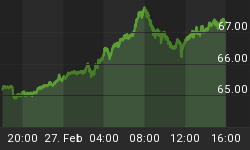A surprisingly strong contingent of writers of independent newsletters and Web sites has declared the market overextended and ready for a rest or a pullback. For this reason, the FIFTI1(Free Information From The Internet) Index from www.InvestorsInternet.com is showing a majority of bears for the short term. 58% of the independent newsletter and Web site writers think that the market has come too far without a pullback. Another 17% are neutral, indicating that they believe some sideways movement is likely before more upside. The previous week it was the bears who were in the majority for the short-term, with 56% of the votes.
There has been no major shift in position. 81% of the writers believe that the market will rally into the year end.
The facts are that for the past four or five weeks the major indexes have risen strongly. The rise for the weeks is shown in the table below.:
Week Ending | Dow | SPX | Nasdaq |
21-Oct | -72.12 | -6.98 | 17.38 |
28-Oct | 187.55 | 18.82 | 7.67 |
4-Nov | 127.99 | 21.73 | 79.55 |
11-Nov | 155.28 | 14.58 | 33.04 |
18-Nov | 80.29 | 13.55 | 24.60 |
Now they are positioned close to, in the case of the Dow Industrials, or above, for the S&P 500 and the Nasdaq, their highs for the year. Indeed the S&P and the Nasdaq have not been this high since 2001.
The writers who were lucid bears in the first half of October are having a difficult time. Some have been silenced, and some have found that there is comfort in writing about small pullbacks with as much obfuscation as possible. "The market needs to show us the money", they say, or they discuss the reasons why the rally should not be happening, without expressing an up or down market view.
The majority of bears, however, have moved their arguments further out along the timescale. There are many reasons why the market should go down in 2006.
The technical argument is that this year's rally is not on a solid footing. The number of new lows is too high, breadth is not good, equity fund manager's cash is low and stable stocks have been out-performed by more speculative ones. Add a cycle low next October for good measure.
The practical argument based on psychology is that last year the market dropped immediately the year finished and Wall Street's bonuses were safely in the bag. Why would this year be any different?
The economic argument is that the consumer's purse strings are closing with the housing market topping. Business investment, which has to pick up by 7% for each 1% drop in consumer spending growth, is unlikely to take up the slack, especially when businesses see consumer spending dropping.
Despite all of these arguments, most of which were being made months ago as reasons why the market would not rally at this time, the economy appears to be doing well and the job market is heading in the right direction, albeit with less vigor and less pay than hoped.
The major unknown is the action the Federal Reserve will take. The market has priced in a rate of 4.5% for January 31, 2006, and a further quarter point beyond that. But will this in fact happen? An early indication that the Fed will stop raising rates could provide a significant boost to the market, while the reverse is also true.
1 The FIFTI Index is based on Free Information From The Internet, and in particular, on advice provided by fifty independent newsletter writers selected from the book "The Investor's Free Internet".















